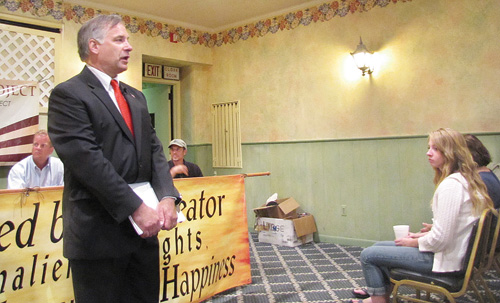Will LIPA loophole lead to board of trustee elections?

Should the Long Island Power Authority’s board of trustees be elected?
When LIPA was originally created by the State Legislature to replace the troubled Long Island Lighting Company, it was supposed to have an elected board of trustees, according to South Fork Assemblyman Fred Thiele (I-Sag Harbor), who has filed bills to try and make the board elected.
However, the state eventually made it an appointed board.
Or did they?
That’s a point Calverton resident Greg Fischer is looking to challenge.
The state Public Authorities Law was updated during the administration of former Gov. George Pataki to clearly indicate that the 15 trustees of LIPA are appointed, but state elections law still contains references to a LIPA board as being elected by the people.
Mr. Fischer and two other men, attorney Bill Jurow from Brookhaven Town and Roger Scott Lewis, a Democratic committee member in Southampton Town, have collected more than 600 signatures on petitions seeking to run for LIPA trustee.
The three men have also filed litigation against both the Suffolk and Nassau county boards of elections to try to force them to accept their petition.
“These positions should be on the ballot,” Mr. Fischer said in an interview. “We’re trying to force a public election of LIPA trustees.”
Mr. Fischer, who ran unsuccessfully last year for Riverhead Town Supervisor and who has run for other elected positions in the past, believes that under the wording of the law, they must be put on the ballot as candidates for the LIPA board, even though, at present, there isn’t a ballot for that position.
Several local officials said they agree that the LIPA board should be elected, and that Mr. Fischer has uncovered a loophole in the law. But they don’t think he’ll be successful.
“It was an oversight, but do I think it was a fatal flaw? No,” said county Legislator Ed Romaine (R-Center Moriches), adding that he believes the LIPA board should be elected.
“I just think that our voices are not being heard and LIPA is not accountable,” Mr. Romaine said. “There really is no one overseeing LIPA at all, other than the state comptroller, and that’s only on audits.”
South Fork Assemblyman Fred Thiele has filed bills several times to make the LIPA board elected, but they’ve never become law.
Two years ago, Mr. Thiele’s bill was approved by the state Assembly but not the Senate. This year, it didn’t make it out of committee in the Assembly and wasn’t even proposed in the Senate.
“The primary opposition is twofold,” Mr. Thiele said. “First, the governor — and not just Gov. Cuomo, any governor — likes being able to control the LIPA board and they don’t want to give that up. And secondly, back in the day when they were supposed to be elected, the LIPA trustee districts were proposed to mirror the senate districts. I think there was the fear that these LIPA trustees would become the farm system for candidates for the senate in the future, so I think some people viewed them as potential political rivals in the future and they didn’t want to create that.”
Mr. Thiele said he still plans to resubmit the bill to make LIPA trustees elected.
“When LIPA was created in the mid-1980s, the trustees were supposed to be elected,” Mr. Thiele said. “But they kept postponing the election and finally, in 1995, Governor Pataki wanted them appointed and he got a bill approved to make them appointed.”
Thus, there has never been an elected board at LIPA, which officially took over from LILCO in 1998.
As for Mr. Fischer’s proposal, Mr. Thiele said, “From the legal aspect, I don’t see this having any chance of success. A court is going to look at the actions taken by the Legislature to make these positions appointed and I don’t see a court disturbing this. But as far as raising awareness of the need to have an elected board, I have to applaud them for highlighting this issue and bringing attention to it. However, I don’t think they will reach their goal through the courts; it will have to be through legislation.
“I didn’t intend to win,” Mr. Fischer said of his filing petitions. “I’m assaulting the castle. I know I’m going to get blown up, I know that, but I’m trying to fix a deep problem that will help our economy. If I can get these rates cut back and get honesty and integrity in the office there, we can get the rates knocked down.”
State Senator Ken LaValle (R-Port Jefferson), who represents the East End, said he was a sponsor of the original LIPA legislation that called for an elected board, and he said he supports an elected board, assuming it has a chance of being approved.
Mr. LaValle also recounted how the original LIPA elections were postponed over and over again until the governor finally said he wanted appointed trustees.
“We said, OK, if that’s what you want,” he recalled.
He said they didn’t make the change in the elections law because the original LIPA law dealt with the public authorities law.
Mr. LaValle said the matter might be moot if a Monday column by New York Post columnist Fred Dicker is accurate. That column suggested the state is going to do away with LIPA altogether.
LIPA spokesman Mark Gross said he doesn’t know where that information came from, but that LIPA is considering “rebranding” and possibly changing its name once PSEG of New Jersey takes over operation of LIPA’s electric system. He said the writer may have been confused by this, hence the column.
“LIPA’s problems go beyond whether it has an elected board or an appointed one,” Mr. LaValle added. “They are very deep-rooted.”
He said if he were grading LIPA, he would give it a D.
LIPA chief operating officer Michael Hervey declined comment on Mr. Fischer’s petitions and lawsuit.








